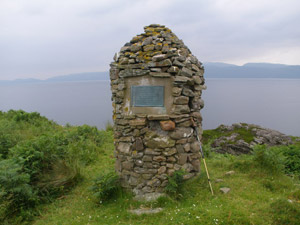WordPress database error: [Got error 28 from storage engine]
SELECT t.*, tt.*, tr.object_id FROM wp_terms AS t INNER JOIN wp_term_taxonomy AS tt ON tt.term_id = t.term_id INNER JOIN wp_term_relationships AS tr ON tr.term_taxonomy_id = tt.term_taxonomy_id WHERE tt.taxonomy IN ('category', 'post_tag', 'post_format') AND tr.object_id IN (19718) ORDER BY t.name ASC
Clan MacEwen History
The MacEwen earliest forebear is Ewen of Otter on the shores of Loch Fyne in Argyll in about 1200, descendants from the original Scots of Dalriada. There are numerous alternative spellings used by the clan.
In 1432 the Barony of Otter was granted to Sween MacEwen by James I, with the remainder to the heir of Duncan Campbell of Loch Aure. Thereafter clan Ewen was without chief and homeland appearing only as dependants of the Campbells or as broken (clanless men).
In 1602 an Act of Parliament lists them alongside MacLachlans and McNeils, as vassals of the Earl of Argyll, who is answerable for their behaviour.
The MacEwens made contributions to Highland civilisation as bards and poets; patrons of the Campbells and MacDougals. In 1630 Neil MacEwen composed a poem on the death of Campbell of Glenorchy.
The MacEwens are reported to have supported the Jacobite uprising of 1715, but only as individuals. One of the most distinguished of this century was Sir Alexander MacEwen, the Scottish Nationalist, Provost of Inverness, the Highland capital.
Clan MacEwen Posts







